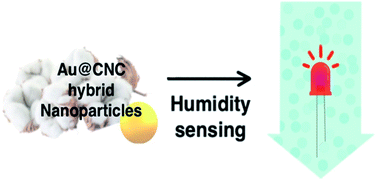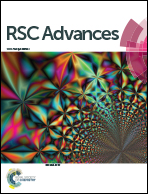Environmentally friendly Au@CNC hybrid systems as prospective humidity sensors†
Abstract
Both cellulose nanocrystals and gold nanoparticles show immense potential for biological and chemical applications. Gold nanoparticles, which tend to aggregate, are hybridized with cellulose nanocrystals to form stable inorganic–organic hybrids in which nanocellulose acts as a green supporting material for the catalytically active gold nanoparticles. A green synthesis approach was taken, and hydrothermal treatment was used to reduce electrostatic repulsion between the gold nanoparticles and the cellulose nanocrystals to promote heteroaggregation instead of homoaggregation. AFM analysis showed hybrid films to be hygroscopic, suggesting that they would respond to changes in humidity. Laser diffraction and fluorescence quenching were used to determine how hybrid films respond to changes in humidity. Hybrid films were found to respond to changes in humidity quickly, reversibly, and autonomously, making them ideal for use as or in a humidity sensor. Gold nanoparticles were shown to enhance the hybrid response to ambient moisture, causing them to show a linear dependence on changes in humidity, making the hybrid controllable, highly sensitive, and a viable prospective material for humidity sensing applications.



 Please wait while we load your content...
Please wait while we load your content...